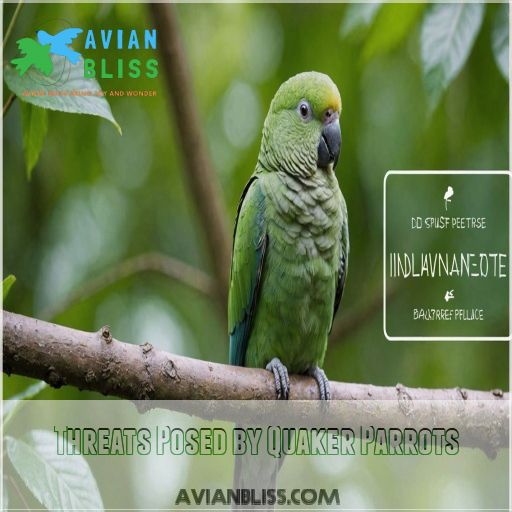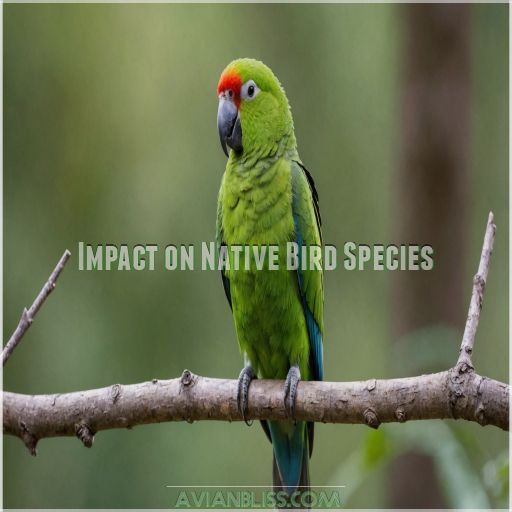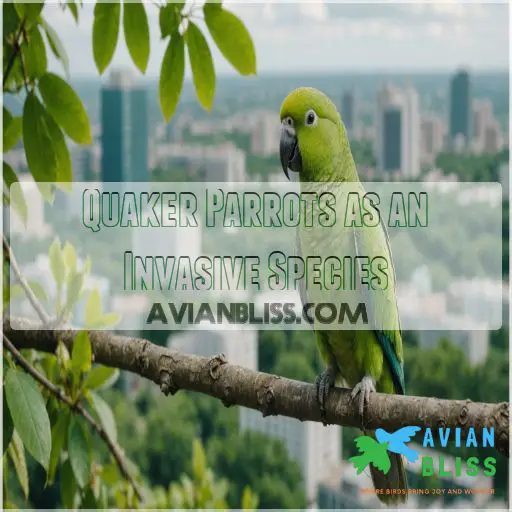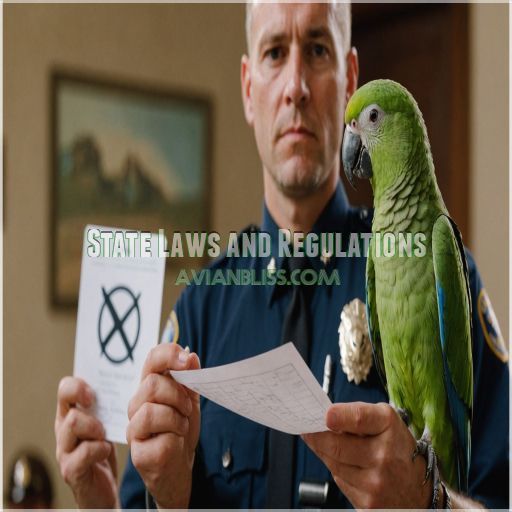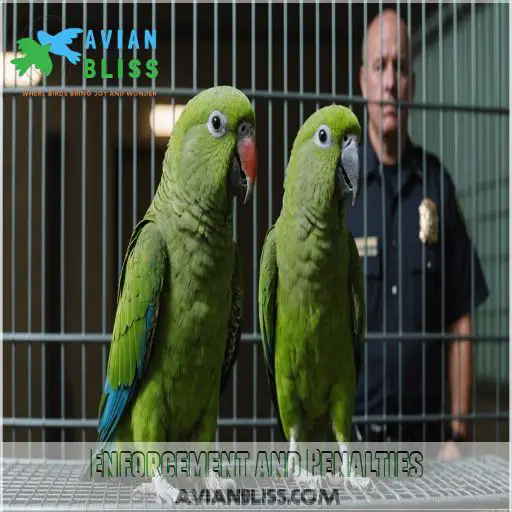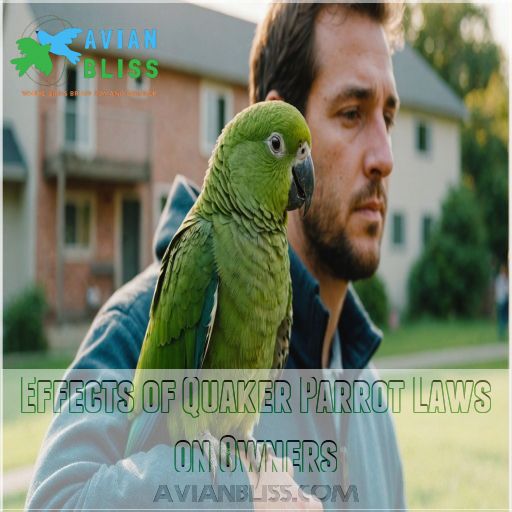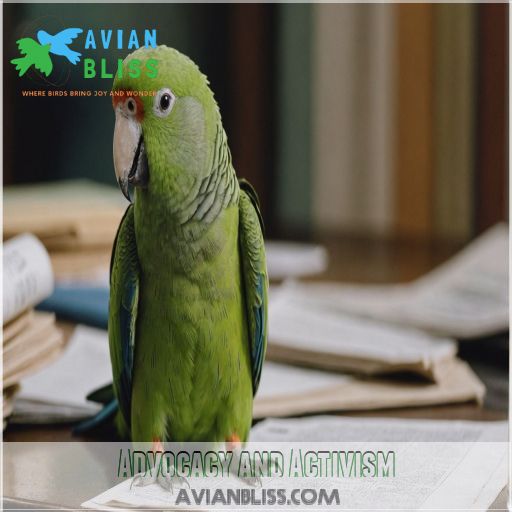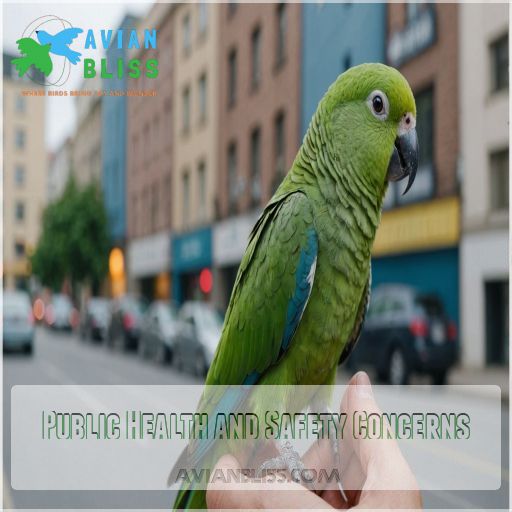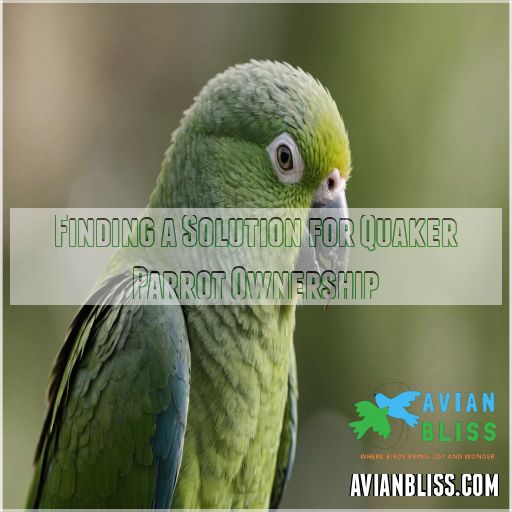This site is supported by our readers. We may earn a commission, at no cost to you, if you purchase through links.
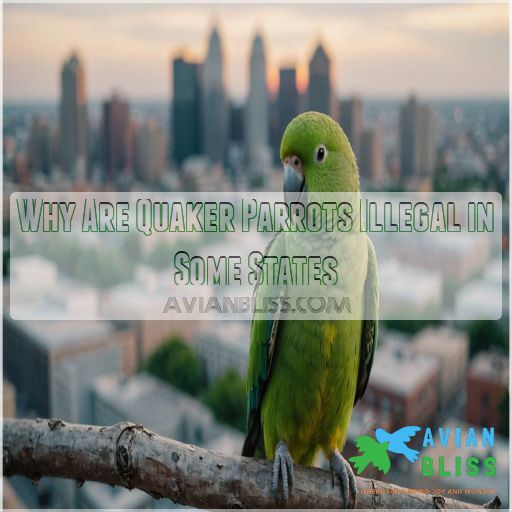
States like California and Connecticut have banned these green menaces to protect local ecosystems and agriculture. But it’s not just about crop damage – these parrots can spread diseases like psittacosis, making them a public health concern.
While they’re charming pets, their wild cousins have ruffled more than a few feathers in the wrong places.
Table Of Contents
- Key Takeaways
- Threats Posed by Quaker Parrots
- Impact on Native Bird Species
- Quaker Parrots as an Invasive Species
- Why Are Quaker Parrots Illegal in Some States
- State Laws and Regulations
- Enforcement and Penalties
- Effects of Quaker Parrot Laws on Owners
- Advocacy and Activism
- Public Health and Safety Concerns
- Finding a Solution for Quaker Parrot Ownership
- Frequently Asked Questions (FAQs)
- What states are Quaker parrots illegal in?
- Why are Quaker parrots illegal in Pennsylvania?
- Why are Quaker parrots illegal in Kansas?
- Why are Quaker parrots illegal in Wisconsin?
- How do Quaker parrots compare to other pet birds?
- Can Quaker parrots be rehabilitated or relocated legally?
- What alternatives exist for potential Quaker parrot owners?
- How do climate differences affect Quaker parrot regulations?
- Are there successful Quaker parrot management programs internationally?
- Conclusion
Key Takeaways
- You might find Quaker parrots charming, but they can cause chaos by munching on farmers’ crops and pushing out local birds. This feathered mischief-maker’s impact on agriculture and ecosystems has led some states to ban them.
- Picture these parrots as nature’s gremlins: they breed like rabbits and adapt faster than a chameleon at a paint store. Their rapid reproduction and adaptability can establish feral populations, making them a real head-scratcher for local authorities.
- Watch out for the health factor! Quaker parrots can spread diseases like psittacosis, putting both humans and birds at risk. That’s another reason some states give these chirpy critters the cold shoulder.
- If you’re thinking of getting a Quaker parrot, do a little homework first. With laws varying by state, owning one can feel like navigating a bird-brained maze of permits and restrictions. Staying informed helps you keep things on the up-and-up!
Threats Posed by Quaker Parrots
Quaker parrots may seem like charming pets, but their aggressive behavior and voracious appetite for crops make them a serious threat in many states.
From disrupting local ecosystems to spreading diseases, these feathered foes have earned their reputation as an invasive species that’s illegal to own in several parts of the country.
Aggressive Behavior Towards Native Birds
Imagine a feathery mob boss! Quaker parrots, or monk parakeets, can be just that in your backyard.
Their aggressive behavior leads to fierce competition for resources, displacing native species. It’s survival of the fittest, and these parrots don’t lose easily.
While it’s impressive, it’s also a threat to biodiversity, sparking conservation efforts to curb their predatory instincts.
Damage to Agricultural Crops
Quaker parrots can wreak havoc on your crops, turning your bountiful fields into their personal smorgasbord. These colorful flyers frequently gobble up fruit, causing economic heartache.
Here’s a taste of their favorite foods:
- Pears and peaches
- Corn fields
- Apple orchards
- Cherry pickings
While charming, these agricultural pests are a farmer’s feathered foe, leading to control methods like legal solutions.
Disruption of Local Ecosystems
When those feathered foes sniff out your crops, it’s not just your peaches and corn that are at risk; entire ecosystems feel the pinch.
As aggressive monks, these parakeets disrupt habitats like an unruly tenant, ousting native birds and hogging food.
With their global wanderlust, they’ve become the unwanted guests in the delicate balance of nature.
Transmission of Psittacosis and Newcastle Disease
Quaker parrots can carry serious diseases like psittacosis and Newcastle disease, which pose a significant threat to both human and bird health.
These illnesses are transmissible and can devastate local bird populations.
Proper hygiene and preventative measures are a must when interacting with these feathered friends to keep everyone safe and healthy.
Impact on Native Bird Species
When Quaker parrots move into a neighborhood, local birds better watch out! These feathered newcomers often take over habitats, pushing native birds aside and throwing local ecosystems off balance.
Displacement of Native Birds From Habitats
Watch out for habitat competition! These parrots don’t ask permission before moving in. They snag the best nesting spots, causing nesting conflicts with native birds.
This nest problem makes them the bullies of the bird world.
Along with food scarcity and increased predation risk, Quaker parrots lead to the displacement of native birds. Even bird clubs are tweeting about it!
Reduction of Native Bird Populations
Keeping native birds on their toes, these cheeky little Quaker parrots love competing for resources like food and nesting spots.
With them around, the ecological balance teeters, leading to a noticeable native bird decline.
It’s like a high-stakes musical chairs, and some native birds just can’t keep up.
**Conservation efforts** often stress this reduction of native bird populations caused by the pet trade and legal status issues, **like the impact of pests on birds**.
Threat to Biodiversity
Sadly, Quaker parrots’ aggressive nature and voracious appetite can wreak havoc on local ecosystems, displacing native birds and disrupting the delicate balance of wildlife.
Their rapid breeding and adaptability make them a formidable threat to biodiversity.
But with responsible ownership and conservation efforts, we can protect our feathered friends for generations to come.
Quaker Parrots as an Invasive Species
So, you want to know why Quaker parrots are causing a fuss as invasive species?
These little chatterboxes from South America are like uninvited guests who reproduce rapidly and adapt to different environments, potentially establishing feral populations in states where they don’t belong.
Non-Native Origins and Adaptability
Considering their impact on native birds, it’s no surprise that Quaker parrots, originating from South America, are pros at thriving elsewhere.
These green chatterboxes adapt like chameleons in:
- Varied climatic zones
- Different ecosystems
- Urban and rural settings
- New food sources
Imagine them donning little disguises and seamlessly blending in! Their adaptability makes them formidable, with a potential for disruptive ecological consequences.
Rapid Reproduction and Spread
During breeding season, Quaker parrots multiply like bunnies, making it tough to rein them in. Their rapid-fire reproduction and spread are no joke.
| Aspect | Details | Impact |
|---|---|---|
| Clutch Size | 5-12 eggs per clutch | Quick population rise |
| Breeding Frequency | Up to six clutches yearly | Overwhelms resources |
| Food Consumption | Pears, corn, peaches | Impact on agriculture |
| Adaptability | Thrives in varied climates | Becomes invasive |
Being the life of the cocktail party might be charming, but not when you’re an invasive species!
Potential to Establish Feral Populations
You may not realize it, but Quaker parrots have the potential to establish feral populations that can wreak havoc on local ecosystems.
These crafty critters can:
- Outcompete native birds for food and nesting sites
- Disrupt the natural balance of bird communities
- Spread diseases that threaten both wild and domestic fowl
- Cause costly damage to power lines and infrastructure
- Become a nuisance in urban and suburban areas
Responsible ownership and population control measures are essential to prevent these feathered invaders from taking over.
Why Are Quaker Parrots Illegal in Some States
You might be surprised, but those cute Quaker parrots can be real troublemakers, and that’s why they’re banned in several states. States see them as feathered invaders, given their knack for causing chaos by spreading disease, harming crops, and pushing out local birds.
List of States With Bans on Quaker Parrots
Imagine a bird so free yet controversial—it’s illegal in some states! Quaker parrots, charming yet disruptive, face bans for their adventurous tendencies.
Here’s a quick look:
| State | Ban Rationale | Impact on Owners |
|---|---|---|
| California | Ecosystem risk | Pet confiscation |
| Connecticut | Crop damage | Financial loss |
| Georgia | Aggression | Emotional challenges |
| Pennsylvania | Disease spread | Legal issues |
Perfect storm of winged challenges!
State-Specific Reasons for the Ban
While states like New Hampshire ban Quaker parrots to protect agriculture and native birds, each has unique reasons.
Invasive species, they gobble local resources like a buffet, harm ecosystems, and carry diseases affecting public health.
Ever seen a parrot hijack a bird feeder? It’s like watching a nature documentary gone rogue, disrupting the environmental balance!
Federal and Local Regulations
Figuring out the complex web of federal and local regulations around Quaker parrots can be tricky.
Some areas require permits, licenses, or even outright bans.
But don’t worry – with a little research, you can find the scoop on what’s allowed in your neck of the woods.
Just be sure to stay on the right side of the law, feathered friends!
State Laws and Regulations
Figuring out the legal side of owning a Quaker parrot can feel like trying to catch a bird with a net made of spaghetti!
Understanding state laws and regulations will help make sure you’re not breaking any rules while enjoying your feathery companion.
States With Total Bans on Quaker Parrots
Regarding Quaker parrots, some states don’t budge an inch, issuing outright bans.
These include California, Connecticut, Georgia, Hawaii, Kentucky, Pennsylvania, Tennessee, and Wyoming.
The ban history is rooted in state legislation aimed at protecting local ecosystems.
Often seen as feathered outlaws, these parrots stir public opinion, impacting bird owners and leaving questions about the future of bans.
States With Partial Bans or Restrictions
Now that you’ve seen the states with total bans, let’s talk about those with partial restrictions.
You’ll find states like Ohio and New York requiring licenses, while others might insist on wing-clipping to stop them from becoming birdie Houdinis.
These local regulations help make sure these plucky parrots don’t cause too much mischief, giving you more control.
Local Ordinances and Permits Required
Owning a Quaker parrot? Not so fast! Local laws may require special permits or even outright bans. To stay on the right side of the law, check your city and county regulations.
Some areas demand wing-clipping, microchipping, or annual renewals. Sorting through the red tape can be a real feather-ruffler, but it’s important for responsible pet ownership.
- Verify local ordinances for Quaker parrot ownership requirements.
- Apply for necessary permits and follow any wing-clipping or microchipping rules.
- Stay up-to-date on annual renewal deadlines to avoid legal troubles.
Enforcement and Penalties
If you’re thinking about owning a Quaker parrot, you might face some serious consequences if you’re in states where they’re illegal.
Hefty fines, the bird police knocking on your door, and your beloved parrot suddenly becoming contraband!
Fines and Fines Amounts for Violations
Picture trying to keep a rogue parrot within your state’s laws—quite the juggling act, right?
If those pesky Quaker parrots land you in hot water, states might hit you with fines up to $1,000.
These penalties aim to clip the birds’ wings legally (and figuratively), keeping their numbers in check.
Understanding state variations helps dodge these legal consequences.
Seizure of Birds and Property
If you’ve ignored fines, authorities might seize your Quaker parrots and even property.
Imagine that—a feathered hostage situation!
It’s like repossessing your couch, only fluffier.
The emotional and legal hurdles owners face are substantial.
Balancing property rights with enforcement is a real tightrope walk, leaving owners feeling like they’ve bitten off more than they can chew.
Warning Periods and Reprieve
Worried about the law? Don’t fret – some states offer a reprieve. Fish and Game may give you a 30-day warning to remove your Quaker parrots before taking action.
Use this time wisely to explore options, like relocating your feathered friends or working with authorities on a compromise.
With a little flexibility, you can find a fair solution.
Effects of Quaker Parrot Laws on Owners
Owning a Quaker parrot in states where they’re illegal can feel like hiding a celebrity from paparazzi; it’s stressful and costly if you get caught.
These laws can lead to your beloved parrot being confiscated, causing emotional heartache and financial losses for owners.
Confiscation of Pets
As a Quaker parrot owner, the prospect of pet confiscation can be a tough pill to swallow.
Let’s break it down:
- Pet Owner Rights: Know what’s permitted.
- Legal Challenges: Navigate the tangled web of laws.
- Emotional Impact: Losing a feathered friend can ruffle your feathers.
- Ethical Considerations: Weigh personal and ecological responsibility.
With understanding, you’re empowered to make informed decisions.
Financial Losses for Owners
Imagine watching your investment vanish like smoke in the wind. Legal restrictions on Quaker parrots can hit your wallet hard, turning treasured pets into financial liabilities.
Bird-lawsuits can ruffle feathers and empty pockets, so stay informed!
These bird-lawsuits can ruffle feathers and empty pockets, so stay informed!
| Concern | Impact |
|---|---|
| Bird confiscation | Significant loss |
| Pet value loss | $5,000 – $10,000 |
| Breeding ban impact | Income decrease |
| Ownership costs | Increased fees |
Emotional Impact on Owners
Losing your beloved Quaker parrot due to a state ban can be heartbreaking.
You may feel confused, frustrated, and even angry – after all, these birds are family members just like corvids.
But don’t lose hope!
Reach out to local bird clubs and advocacy groups – they can provide emotional support and guidance on working through this tricky situation.
Advocacy and Activism
If you’re a fan of Quaker parrots, you’ve got some allies in the fight against restrictive laws.
Bird lovers are flocking together to support owners by raising awareness and campaigning for changes to the regulations.
Bird Owner Associations and Support
Imagine this: you’re part of a quirky bird owner community that rallies for their feathery friends’ rights.
With energy devoted to repeal efforts and legal defense, these associations champion community support and education.
They highlight owner rights and build public awareness.
Whether swapping stories or hosting parrot playdates, they unite to make sure you can enjoy your Quaker parrot’s colorful antics.
Lobbying for Repeal or Amendment of Laws
Lobbying to change Quaker parrot laws isn’t for the faint-hearted! You can join forces with others to amplify your voice. Here’s how:
- Organize campaigns: Rally support and get public opinion on your side.
- Present legal arguments: Engage in state politics by showcasing the economic impact.
- Forge alliances: Connect with lawmakers willing to rethink these outdated laws.
Raising Awareness About Quaker Parrots
Raising awareness about Quaker parrots is important for responsible ownership and conservation. By educating the public, you can dispel myths, promote understanding, and rally support for sensible policies. Join forces with bird clubs, rescue organizations, and local authorities to spread the word – these feathered friends deserve a fair shake.
| Quaker Parrot Facts | Parrot Ownership Laws | Conservation Efforts |
|---|---|---|
| Intelligent, social birds | Vary by state and locality | Protect native ecosystems |
| Adaptable to diverse habitats | Permits, restrictions, or bans | Promote responsible ownership |
| Potential threats to agriculture | Enforcement and penalties | Collaborate with authorities |
| Disease transmission concerns | Understand local regulations | Raise public awareness |
| Nuisance behaviors (nesting) | Comply for bird’s well-being | Advocate for balanced policies |
Public Health and Safety Concerns
When it comes to Quaker parrots and your health, there’s more than just cute chirping to consider—they can actually spread psittacosis and Newcastle disease.
While these birds might win hearts with their talkative nature, their potential health impacts can’t be ignored, so some states have said, "no thanks!" to their ownership.
Risk of Psittacosis Transmission to Humans
After standing up for bird rights, consider the quirky but important topic of psittacosis transmission from Quaker parrots.
You’ll want to avoid flu-like symptoms by practicing excellent hygiene and cleaning around your parrot.
Psittacosis isn’t a death sentence—it’s treatable. But play it safe; prevention’s worth a pound of cure.
Stay sharp with disease prevention to enjoy your feathered friend safely, and learn more about safe snacking tips for your bird!
Impact of Newcastle Disease on Local Bird Populations
Newcastle disease, a highly contagious viral infection, can wreak havoc on local bird populations.
You might be surprised to learn that it’s not just a threat to your backyard feathered friends, [but also a potential choking hazard](https://avianbliss.com/can-birds-eat-popcorn-kernels/).
This sneaky virus can spread like wildfire, causing devastating mortality rates among both wild and domestic birds like Psittacosis.
It’s a real nightmare for poultry farmers and wildlife enthusiasts alike, potentially wiping out entire flocks in the blink of an eye.
Safety Measures for Interacting With Quaker Parrots
When interacting with Quaker parrots, safety should be your top priority.
To prevent psittacosis transmission, always wash your hands before and after handling these feathered friends.
Keep their living space clean as a whistle, and make sure there’s good ventilation.
Don’t let their cute appearance fool you – maintain a safe distance and avoid kissing or snuggling them.
By following these simple steps, you’ll be protecting yourself and your avian companions from potential health risks.
Finding a Solution for Quaker Parrot Ownership
You might be wondering how to navigate the complex world of Quaker parrot ownership in states with restrictions.
Let’s explore some potential solutions that balance responsible pet ownership with addressing the concerns that led to these laws in the first place.
Education and Responsible Ownership
If you’re considering a Quaker parrot as a pet, education is key. Learn about their unique needs, from diet to enrichment activities.
Responsible ownership means understanding the bird’s natural behaviors and potential challenges, like understanding their foraging behaviors. You’ll need to commit to regular vet check-ups, proper housing, and social interaction.
Permitting and Licensing Requirements
- Research your state’s specific permit requirements
- Prepare for potential licensing fees
- Familiarize yourself with the application process
- Mark your calendar for renewal procedures
By staying informed, you’ll be well on your way to becoming a responsible Quaker parrot owner.
Regulations for Safe and Healthy Bird Keeping
You’ve got your permit, but keeping your Quaker parrot healthy and safe is an ongoing commitment.
Let’s explore some key regulations that’ll help you be a great bird parent.
From bird disease prevention to proper nutrition, these guidelines aren’t just red tape—they’re your feathered friend’s ticket to a happy life.
Ready to create a parrot paradise? Let’s ruffle some feathers (in a good way)!
Frequently Asked Questions (FAQs)
What states are Quaker parrots illegal in?
Picture a colorful quaker parrot, perched behind bars.
You’ll find these feathered friends illegal in California, Connecticut, Georgia, Hawaii, Kentucky, Pennsylvania, Tennessee, and Wyoming.
Always check your state’s laws before bringing one home.
Why are Quaker parrots illegal in Pennsylvania?
Pennsylvania banned Quaker parrots due to their potential agricultural impact and threat to native species.
These feathered troublemakers can cause crop damage, outcompete local birds, and build large nests that interfere with power lines.
It’s a birdie balancing act!
Why are Quaker parrots illegal in Kansas?
Kansas hasn’t explicitly banned Quaker parrots, but their status remains murky.
State wildlife officials are wary of potential agricultural impacts and ecosystem disruption.
It’s best to check with local authorities before bringing one home.
Why are Quaker parrots illegal in Wisconsin?
Like a stealthy invader, Quaker parrots aren’t welcome in Wisconsin.
They’re illegal due to their potential to become invasive, damage crops, and outcompete native birds.
You’ll need to look elsewhere for your feathered friend fix!
How do Quaker parrots compare to other pet birds?
You’ll find Quaker parrots are chattier and more social than many pet birds.
They’re clever little rascals, often outsmarting their owners!
While they’re smaller than some popular parrots, their big personalities more than make up for it.
Can Quaker parrots be rehabilitated or relocated legally?
Rehabilitating or relocating Quaker parrots legally can be tricky.
While some states allow it under strict guidelines, many don’t due to invasive species concerns.
Your best bet? Check local laws and consult wildlife experts for guidance.
What alternatives exist for potential Quaker parrot owners?
You’ll chirp with joy exploring these feathered friends: budgies, cockatiels, or lovebirds.
They’re legal, lovable, and less likely to ruffle authorities’ feathers.
Plus, they’re a hoot to have around without the legal nest-ache!
How do climate differences affect Quaker parrot regulations?
Climate differences play a big role in Quaker parrot rules.
Warmer states often have stricter laws, fearing the birds will thrive and become invasive.
Colder regions may be more lenient, as harsh winters naturally limit wild populations.
Are there successful Quaker parrot management programs internationally?
Picture a bird flying free, then caged. That’s the Quaker parrot dilemma.
You’ll find some success stories abroad.
Spain’s using sterilization, while the UK’s trying humane population control.
It’s a balancing act between conservation and compassion.
Conclusion
Did you know that over 30,000 Quaker parrots now inhabit the U.S., despite being illegal in some states? These clever birds have certainly ruffled some feathers!
While they’re charming pets, their wild cousins pose serious threats to ecosystems and agriculture.
Understanding why Quaker parrots are illegal in some states is important for responsible ownership. If you’re considering one as a pet, check your local laws first. With proper education and regulations, we can find a balance between appreciating these charismatic birds and protecting our environment.

